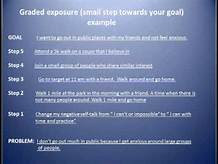A definition of fear:-
fear
noun
- 1.an unpleasant emotion caused by the belief that someone or something is dangerous, likely to cause pain, or a threat:"he is prey to irrational fears"synonymsantonyms
Alex Niles in 'Psychology Today' describes fear as "an emotional response induced by a perceived threat that causes a change in brain and organ function, as well as in behaviour."
To cope with fear we need to be able to:
- firstly face up to it (Acknowledgement),
- secondly understand it (what has caused it and how it manifests itself)
- and lastly overcome it (manage & control)
SO how can we do 1 and 2 in order to achieve 3??
Firsty, we need to understand that with fear often comes avoidance, whether it be of people, situations or places. This in turn causes anxiety and fear.
Avoidance is an important concept to help us understand why our anxiety is maintained and increases. eventually we end up thinking that the only way i can cope with these situations is to avoid them.
We need to face the fear through stages one step at a time.
- Setting targets:- identifying the situations that are avoided and/or cause anxiety (be specific and detailed). Start with the easiest tht you are most likely to tackle initially.
- Grade these tasks/targets:- break each one (starting with the easiest) down into smaller specific tasks, increasing in difficulty. Be confident in your prospect of achieving this. Use coping skills that you have used before to tackle this.
- Practice:- Taking each task one at a time, using your coping skills, practice these tasks until it is no longer difficult for you to do. It is perfectly natural to experience some anxiety whilst doing this but your confidence will grow as long as you practice often and regularly. Daily if possible.
Resources:
- Working Minds UK: https://www.working-minds.org.uk/documents/graded-exposure.pdf
- Very Well Mind: https://www.verywellmind.com/practice-social-anxiety-disorder-exposure-therapy-3024845
- OCD UK: https://www.ocduk.org/overcoming-ocd/accessing-ocd-treatment/exposure-response-prevention/











